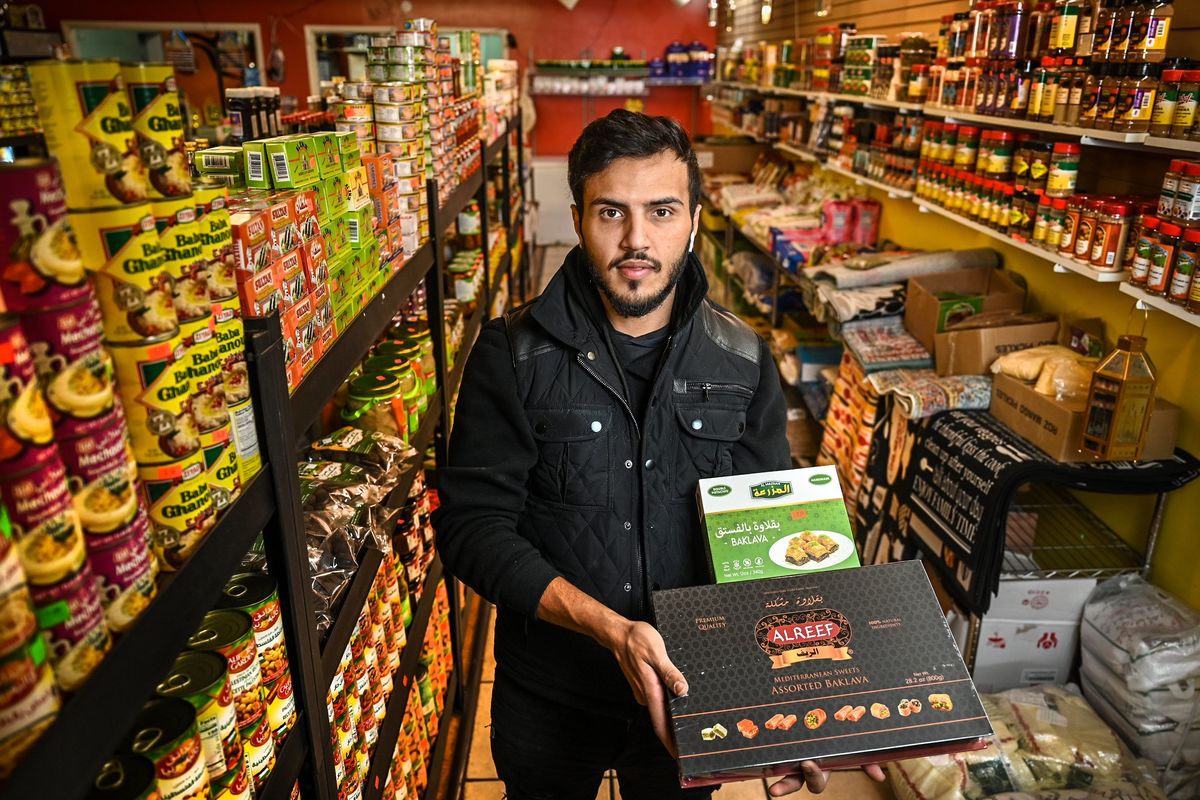Specialty food market brings flavors, taste of Middle East to Spokane

For many customers, walking into Karar Market feels like home.
That’s because it smells like home. Owner Karar Al Shamarti sells several types of incense heaters as well as a variety of incense from Saudi Arabia and the United Arab Emirates.
“I sell traditional incense to make the home smell good,” he said. “We always have it burning.”
Al Shamarti, 25, opened the market four months ago at the site of the former Mariam International Foods on Wellesley across from NorthTown Mall.
The Ferris High School graduate came to the U.S. with his family seven years ago.
“We left Iraq and went to Turkey and then to the U.S.,” he said.
He has plenty of retail experience.
“When I was young, my dad had a big store in Iraq, and I used to work there after school,” Al Shamarti recalled. “I knew all of the prices in my head!”
Shoppers at Karar Market can browse among blankets from Morocco, perfumes and colognes from Saudi Arabia and decorative housewares, including coffee and tea sets, but the bulk of the merchandise is grocery items.
“I sell Middle Eastern, Afghani and Asian foods,” he said.
Rose water and raw pistachios for Persian baklava mingle on the shelves with cans of stuffed grape leaves, falafel mixes, date syrup and liquid saffron.
Rows of refrigerator cases hold kefir cheese, Turkish sausage and basil seed soft drinks.
Al Shamarti pulled a bottle of Azure Basil Seed strawberry drink from the cooler.
“I love these!”
The Turkish rope sausage reminds him of the time he spent there.
“I always had this for breakfast,” he said. “They use different spices than they do here.”
A nearby freezer is filled with halal meat, including lamb, goat, beef and chicken. Halal is an Arabic word that means “permissible.” It designates food that is permissible according to Islamic law.
“The animals are killed in the right way – painlessly and prayed over,” explained Al Shamarti.
He pointed to a package of heat-and-serve halal shawarma.
“This is so delicious!”
Shawarma originated in Turkey and is a popular street food in the Middle East. It features thin slices of seasoned spit-roasted lamb, beef or other meat wrapped in or served with pita.
Other prepared frozen meals include samosas and kebabs.
Al Shamarti has big plans for the meat department.
“My next step is applying for a license to sell fresh meat.”
Speaking of fresh, his most popular items are the traditional breads he brings in each week.
“Every Thursday, I drive to Kennewick and pick up the bread,” he said. “Friday, Saturday and Sunday, I sell it fresh. Whatever doesn’t sell goes in the freezer.”
He opened a freezer to reveal stacks of fluffy round Egyptian pita bread and diamond-shaped Iraqi samoon.
Al Shamarti said the Iraqi flatbread is baked in a clay oven and is usually sliced in the center and filled with whatever meats or cheeses are on hand.
It’s what regular customer Nimr Esho stopped in for.
“This bread is the best for breakfast!” he said while paying at the counter. “It’s one of the essential things we buy here – I’m here twice a week.”
The same Kennewick baker also supplies traditional date biscuits and sesame cookies that are also a hit with shoppers.
Snack foods like roasted chickpeas and jumbo red melon seeds line the shelves.
“I grew up eating these,” Al Shamarti said. “Eventually, I will sell them in bulk.”
Staples including ghee and tandoori spice are found near condiments like tahini and pomegranate molasses, and unique chips and candies tempt shoppers near the cash register.
Al Shamarti is committed to trying new things in his traditional market. In addition to selling fresh meat, he recently completed the steps to use the Karar label on many of his products. He plans to be open 24 hours a day during Ramadan, which is observed by Muslims worldwide as a month of fasting, prayer, reflection and community.
“I will bring in fresh baklava,” he said. “People will be hungry after they fast.”
He enjoys introducing new customers to the culture and food of his home.
“I love having this kind of store with all of the things I tasted in my dad’s market when I was growing up,” Al Shamarti said.